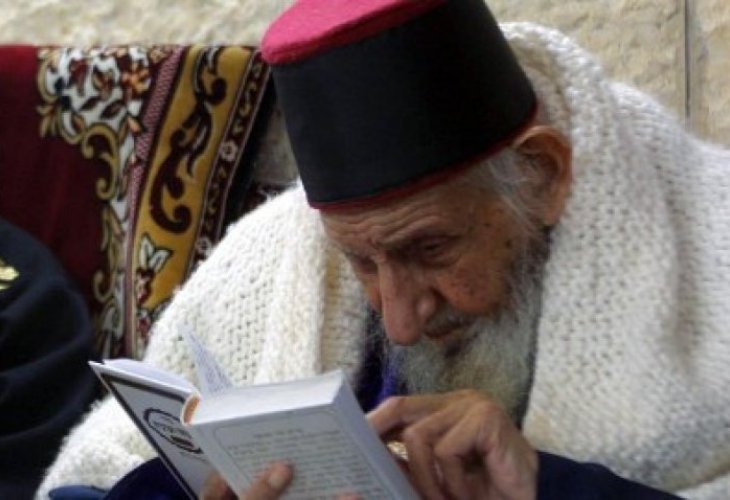Torah Personalities
The Quiet Power of Rabbi Kaduri: The Last Great Kabbalist of Our Time
From hidden kabbalistic knowledge to whispered blessings and healing remedies, Rabbi Kaduri guided generations with mystery, faith, and unshakable humility
 Rabbi Yitzhak Kaduri
Rabbi Yitzhak KaduriFrom Baghdad to Jerusalem: A Life of Torah and Kabbalah
Today, the 29th day of the Jewish month of Tevet, marks 19 years since the passing of Rabbi Yitzchak Kaduri, one of the most beloved and mysterious kabbalists of the modern era. Born in Baghdad, Iraq, he passed away in Jerusalem in 2006.
Known in his final years as the “Elder of the Kabbalists,” Rabbi Kaduri was widely revered as a righteous man whose prayers brought salvation. He served as the head of Yeshivat HaMekubalim Nachalat Yitzchak, founded by his son, Rabbi David Kaduri.
He was born on the 16th of Tishrei, the day of the ushpizin (spiritual guest) of Yitzchak on Sukkot, and was named accordingly. His father, a spice merchant, sent him to learn at the central beit midrash (study hall) of Baghdad’s sages. As a child, he met the famed Ben Ish Chai, Rabbi Yosef Chaim of Baghdad. Though it is unclear exactly when Rabbi Kaduri was born, most sources point to 1898.
In 1922, well before the establishment of the State of Israel, he immigrated to the Land of Israel and studied at Yeshivat Porat Yosef and Yeshivat Shoshanim L’David. He married his first wife, Sarah, and they had two children: David and Rachel. After the founding of the State, he joined Yeshivat HaMekubalim Beit El and worked humbly as a bookbinder while dedicating himself to Torah study. Later, he became the Rosh Yeshivah of Nachalat Yitzchak.
Hidden Wisdom, Visible Miracles
Though he was best known for his mastery of Kabbalah (mysticism), those close to Rabbi Kaduri knew his greatness in revealed Torah learning as well, though it was masked by his incredible humility and modesty.
One well-known story illustrates his detachment from material wealth. A wealthy man, noticing the rabbi’s poverty, left a $10,000 check on his desk out of compassion. But Rabbi Kaduri was so deeply immersed in his learning that he didn’t notice. He absentmindedly placed the check in a book as a bookmark and returned it to the bookshelf. Years later, the expired check was discovered, uncashed.
Rabbi Kaduri sought to ease the suffering of Am Yisrael through segulot (spiritual remedies), amulets, and natural remedies. His desk often held mysterious items: aromatic herbs, dates, grains of wheat, and almonds. After blessing them, he sometimes inscribed holy names or angelic symbols on them with his own feather pen. For those who stuttered, he gave hyssop; for women struggling with infertility, grains of wheat. Doctors themselves were known to say, “Rabbi Kaduri’s apples heal more than medicine.”
A Blessing That Never Missed
The amulets Rabbi Kaduri prepared were crafted with care: some on parchment, others on plain paper, all written with special pens. In his later years, he used prepared amulets and added the name of the person in need by hand. Thousands came to him for blessings, and countless stories of miraculous salvation followed. When asked how his blessings always came true, he once quipped with a smile: “It’s because I’m so old, the angels show me respect and listen.”
One remarkable story involved an Arab man from Jordan who had been childless for years. Desperate, he traveled to Jerusalem and wept before Rabbi Kaduri. The rabbi blessed him wholeheartedly, and within a year, the man’s wife gave birth to a baby boy. Returning to thank Rabbi Kaduri, the man announced that he had named the child “Yitzchak” in honor of the Jewish sage whose blessing brought him hope. The story spread across Jordan, inspiring awe even among non-Jews.
Another chilling tale took place just before Rosh Hashanah in 2001. An American businessman sought Rabbi Kaduri’s advice about a potential deal. The rabbi replied, “I don’t know about your deal, but don’t return to New York before Shabbat.” The man insisted he had a plane ticket for that night, but Rabbi Kaduri repeated: “They’ll forgive you for that.” He stayed in Israel. Days later, the Twin Towers fell. His office was high in the World Trade Center. Had he returned, he and his entire team would likely have perished.
A Humble Departure, A Lasting Legacy
Rabbi Kaduri passed away at an extraordinary age on the 29th of Tevet, 2006. Estimates of his age range from 104 to 110. His funeral in Jerusalem drew hundreds of thousands of mourners, and Israeli television stations broadcast the procession live. To this day, his teachings, blessings, and whispered words continue to inspire awe.

